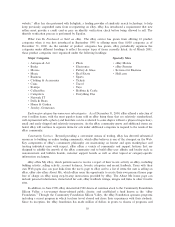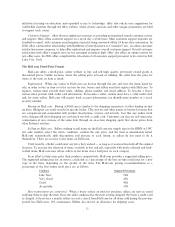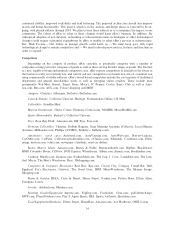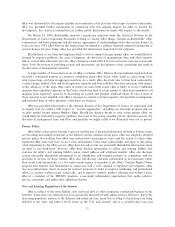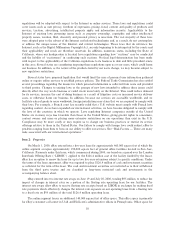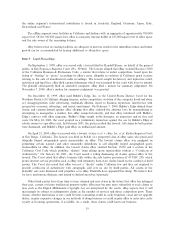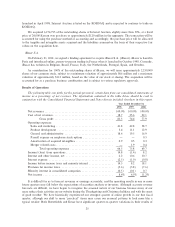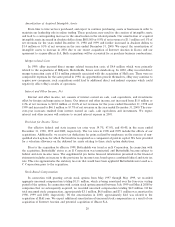eBay 2000 Annual Report Download - page 24
Download and view the complete annual report
Please find page 24 of the 2000 eBay annual report below. You can navigate through the pages in the report by either clicking on the pages listed below, or by using the keyword search tool below to find specific information within the annual report.the online segment's international subsidiaries is leased in Australia, England, Germany, Japan, Italy,
Switzerland and France.
The oÉine segment owns facilities in California and Indiana with an aggregate of approximately 700,000
square feet. Of the 700,000 square feet, eBay is a majority interest holder in 187,000 square feet of oÇce space
and the sole owner of the remaining balance.
eBay believes that its existing facilities are adequate to meet its needs for the immediate future and future
growth can be accommodated by leasing additional or alternative space.
Item 3: Legal Proceedings
On September 1, 1999, eBay was served with a lawsuit Ñled by Randall Stoner, on behalf of the general
public, in San Francisco Superior Court (No. 305666). The lawsuit alleged that eBay violated Section 17200
of the California Business & Professions Code, a statute that relates to unfair competition, based upon the
listing of ""bootleg'' or ""pirate'' recordings by eBay's users, allegedly in violation of California penal statutes
relating to the sale of unauthorized audio recordings. The lawsuit sought declaratory and injunctive relief,
restitution and legal fees. eBay Ñled a general demurrer which was sustained by the court with leave to amend.
The plaintiÅ subsequently Ñled an amended complaint. eBay Ñled a motion for summary judgement. On
November 7, 2000, eBay's motion for summary judgement was granted.
On December 10, 1999, eBay sued Bidder's Edge, Inc. in the United States District Court for the
Northern District of California alleging trespass, unfair competition, violation of the computer fraud and abuse
act, misappropriation, false advertising, trademark dilution, injury to business reputation, interference with
prospective economic advantage, and unjust enrichment. On February 7, 2000, Bidder's Edge denied these
claims and counterclaimed against eBay alleging that eBay violated the antitrust laws by monopolizing or
attempting to monopolize a market, that eBay competed unfairly, and that eBay interfered with Bidder's
Edge's contract with eBay magazine. Bidder's Edge sought treble damages, an injunction and its fees and
costs. On May 24, 2000, the court granted us a preliminary injunction against the use by Bidder's Edge of
robotic means to copy eBay's site. In February 2001, the parties settled this lawsuit. All claims by both parties
were dismissed, and Bidder's Edge paid eBay an undisclosed amount.
On April 25, 2000, eBay was served with a lawsuit, Gentry et.al. v. eBay, Inc. et.al, Ñled in Superior Court
in San Diego, California. The lawsuit was Ñled on behalf of a purported class of eBay users who purchased
allegedly forged autographed sports memorabilia on eBay. The lawsuit claims eBay was negligent in
permitting certain named (and other unnamed) defendants to sell allegedly forged autographed sports
memorabilia on eBay. In addition, the lawsuit claims eBay violated Section 17200 and a section of the
California Civil Code which prohibits ""dealers'' from selling sports memorabilia without a ""CertiÑcate of
Authenticity.'' On January 26, 2001, the Court issued a ruling dismissing all claims against eBay in the
lawsuit. The Court ruled that eBay's business falls within the safe harbor provisions of 47 USC 230, which
grants internet service providers such as eBay with immunity from state claims based on the conduct of third
parties. The Court also noted that eBay was not a ""dealer'' under California law and thus not required to
provide certiÑcates of authenticity with autographs sold over its site by third parties. All counts of the
plaintiÅs' suit were dismissed with prejudice as to eBay. PlaintiÅs have appealed this ruling. We believe that
we have meritorious defenses and intend to defend ourselves vigorously.
Other third parties have from time to time claimed and may claim in the future that eBay has infringed
their past, current or future intellectual property rights. eBay may become more vulnerable to such claims as
laws such as the Digital Millennium Copyright Act are interpreted by the courts. eBay expects that it will
increasingly be subject to infringement claims as the number of services and direct competitors grow. These
claims, whether meritorious or not, could be time-consuming, result in costly litigation, cause service upgrade
delays, require expensive changes in our methods of doing business or could require eBay to enter into costly
royalty or licensing agreements, if available. As a result, these claims could harm our business.
19



